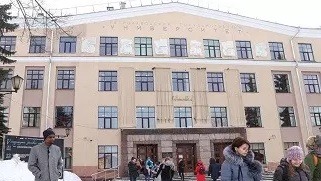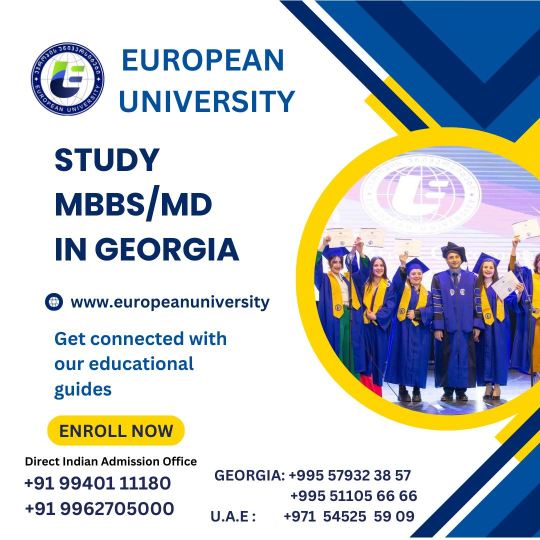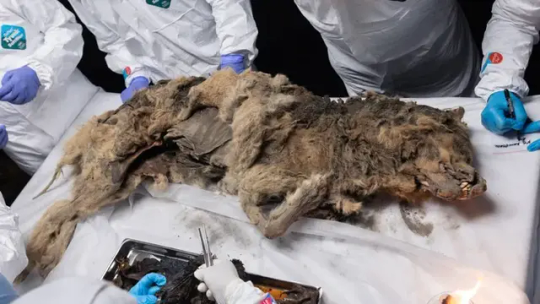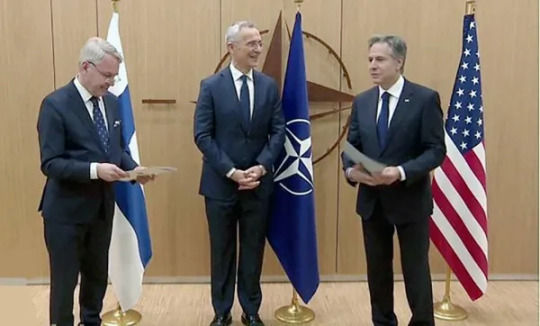#Study medicine in Russia
Explore tagged Tumblr posts
Text
Advantage of Studying MBBS in Russia

Studying medicine is a significant decision, and choosing the right place to pursue your MBBS is crucial. Russia has emerged as a popular destination for medical education, offering numerous advantages to students seeking a quality medical degree. In this guide, we'll explore the benefits of studying MBBS in Russia in simple terms, along with its potential impact on your future career.
1. Affordable Education: Studying MBBS in Russia is budget-friendly. Compared to other countries, the tuition fees and living costs are reasonable. This means you can pursue your dream of becoming a doctor without worrying too much about financial burdens.
2. High-Quality Education: Russian medical universities are known for their excellent education standards. They follow international guidelines, ensuring that the education you receive is top-notch. With a degree from Russia, you'll be well-prepared for a successful career in medicine.
3. Diverse Environment: Studying MBBS in Russia exposes you to a diverse environment. You'll meet students from various backgrounds and cultures. This multicultural setting enriches your experience and helps you develop a global perspective, essential for a career in medicine..
4. Language Options: While Russian is the primary language, many universities offer MBBS programs in English. This is beneficial for international students who may not be fluent in Russian. Learning Russian alongside your studies can also be advantageous for your future medical practice.
5. Strong Academic Tradition: Russia has a rich history of excellence in medical education and research. Many medical breakthroughs have originated from Russian institutions. By studying in Russia, you become part of this legacy, gaining access to valuable academic resources and opportunities.
6. Straightforward Admission Process: Applying to study MBBS in Russia is simple. The admission process typically involves submitting academic documents and other required paperwork. Unlike some other countries, you may not need to sit for entrance exams, making the process smoother.
Studying MBBS in Russia offers numerous benefits, including affordability, quality education, global recognition, and exposure to a diverse environment. With modern facilities, a strong academic tradition, Russia provides an excellent platform for aspiring medical professionals to fulfill their dreams.
#Study medicine in Russia#Advantages of MBBS in Russia#Russian medical universities#MBBS in Russia#Admission process for MBBS in Russia#Top ranking Govt. Universities in Russia
2 notes
·
View notes
Text

MBBS in Russia offers affordable tuition, globally recognized degrees, and modern medical infrastructure. Renowned universities provide quality education with experienced faculty, making it a popular choice for international students pursuing medical careers.
0 notes
Text

MBBS in Russia is the best option for students who want to pursue a career in medicine and gain international experience. With modern infrastructure, experienced teachers, and a diverse student body, Russia offers the best environment for students to achieve their educational and professional goals.
0 notes
Text
Why do the years 2020 and 2019 seem so long ago? Whenever someone mentions “yeah 2019 I did-“ oh you mean during the depression? the invisible plague that wreaked havoc across the globe? do you still feel 17? 12? 18? 26? Your’e older know, not just physically, mentally you’ve aged fifty years. 2019 wasn’t five years ago, it was a lifetime ago, it was another world ago, another you. I mourn each time you mention it.
#love#fashion#truth#quote#mental health#poem#poetry#books#friends#muslim#2019#prepandemic#pandemic#COVID-19#danbilzerian#sneako#Russia#trump#Kamala Harris#2020#2020vision#vine#TikTok#postpandemic#medicine#study#tumblr#tumblr staff#supernatural#Wednesday
21 notes
·
View notes
Text
Study MBBS/MD in Georgia MBBS Admission is Open European University Tbilisi Georgia May Intake 2023-2024

❇️Best Medical university in Georgia
❇️The medium of instruction is English for the whole 5 years + 1-year internship.
❇️South Indian hostel available with indian cuisine 3 times daily.
❇️NMC ( MCI ) Approved Medical University
❇️separate hostels for boys and girls
❇️24/7 Library
❇️Recognized by WHO
❇️Private Medical University
2 notes
·
View notes
Text
Can You Really Do MBBS Abroad Without NEET?

For many aspiring doctors in India, NEET has long been seen as the gateway to a career in medicine. But with the intense competition and stress involved, more students are now exploring alternative paths—especially abroad—to fulfill their dream of becoming a doctor.
Why Students Are Looking Beyond NEET
Every year, lakhs of students prepare for NEET, but only a fraction secure seats in government colleges. Private medical colleges in India are an option, but the high tuition fees (often reaching ₹1 crore or more) make them unattainable for many. For those who don’t clear NEET, the pressure to repeat the exam adds to the stress.
To avoid this cycle, many students are choosing to study MBBS abroad, where opportunities are more accessible and affordable.
Popular Destinations for MBBS Abroad
Countries like Russia, Ukraine, China, and the Philippines have traditionally been popular for Indian students seeking medical education. They offer:
Affordable tuition fees.
No requirement for NEET (in some cases).
Globally recognized degrees.
However, recent geopolitical issues, such as the ongoing conflict in Ukraine, have made students reconsider these destinations.
Why Students Are Opting for Stress-Free MBBS Paths
No NEET Required: Many universities abroad don’t require NEET for admission, removing the burden of repeated attempts.
Lower Costs: Tuition fees abroad are often much lower than private medical colleges in India.
Better Opportunities: Clinical rotations in top hospitals and pathways to practice in countries like the USA make these programs attractive.
Globally Recognized Degrees: Medical universities abroad are recognized by bodies like WHO, ECFMG, and NMC, ensuring career flexibility.
Is MBBS Without NEET Possible in India?
While MBBS without NEET is legally not possible in India, some students opt for courses in allied medical fields or explore management quota options. However, these come with exorbitant fees, pushing more students to explore affordable options abroad.
The Verdict
Yes, you can pursue MBBS abroad without NEET in some countries, and this path is becoming increasingly popular. With the right research and planning, students can find affordable, stress-free options that offer quality education and excellent career opportunities.
A Personal Recommendation
I personally know several friends who chose to go abroad for their MBBS, and they’ve had great experiences. If you’re willing to explore this option and have any doubts, I highly suggest consulting with New Edge Overseas. They can guide you to colleges where you can complete your MBBS within 50 lakhs, making it an affordable and feasible option.
I'll paste their website below.
https://newedgecs.com/
#academia#college#college life#duolingo#grammar#high school#studying#university#mbbs abroad#mbbs#mbbs in russia#mbbs in kazakhstan#mbbs in china#study abroad consultants#medicaleducation#studytips#medicine#health
0 notes
Text
International School of Medicine (ISM) Kyrgyzstan
The International School of Medicine Kyrgyzstan (ISM), headquartered in Kyrgyzstan, has established itself as a prominent school in medical education, attracting students from all over the world. ISM stands out for its cutting-edge facilities, multicultural environment, and emphasis on practical, hands-on training. This page looks into the history, academic offerings, campus facilities, admissions procedure, and other important features of ISM, providing a thorough description for potential students.
The International School of Medicine, which is part of the International University of Kyrgyzstan (IUK), was founded in 2003. The university was established to meet the global demand for qualified medical professionals. ISM has built a solid reputation over the years for its high-quality curriculum, knowledgeable professors, and commitment to producing competent doctors.
The school’s mission is to train highly skilled professionals capable of meeting international standards in healthcare. By integrating modern teaching methodologies and fostering a research-driven environment, ISM aims to contribute significantly to the global healthcare landscape.
Academic Programs and Curriculum
ISM provides a number of programs tailored to different stages of medical education. These programs are designed to comply with global medical education standards, ensuring that graduates are well-prepared to practice medicine wherever.
ISM's flagship curriculum, MBBS (Bachelor of Medicine and Bachelor of Surgery), is a six-year course with five years of academic study and one year of internship. The program is deliberately planned to balance theoretical knowledge with practical abilities. The key fields of study are:
Anatomy
Physiology
Biochemistry and pathology
Pharmacology
Clinical Medicine
2. Postgraduate degrees: ISM provides MD and Ph.D. degrees in areas such as internal medicine, surgery, pediatrics, and more. These programs focus on research and advanced clinical training.
3. Preparatory Courses: ISM offers preparatory courses to overseas students to assist them adjust to the academic structure and language requirements. These classes cover topics such as biology, chemistry, and the Russian language.
Accreditations & Recognitions
ISM is accredited by various prestigious medical councils and organizations around the world, ensuring that its degrees are internationally recognized. This includes:
World Health Organization (WHO), National Medical Commission (NMC) of India.
Educational Commission for Foreign Medical Graduates (ECFMG), United States
Medical Councils in several nations
This recognition allows graduates to obtain medical licensure and practice in countries such as India, the United States, the United Kingdom, and others.
Campus & Facilities
ISM's contemporary campuses in Bishkek, Issyk-Kul, and Osh provide students with a pleasant academic environment. The key facilities include:
Classrooms and Laboratories: Advanced technologies, including 3D simulation labs, enable hands-on learning experiences.
Library and Digital Resources: The library offers extensive collections of medical textbooks, journals, and research papers. Students also get access to internet medical databases, which ensures they are up to date on the latest breakthroughs.
Hospitals and Clinical Training Centers: ISM has connections with top hospitals in Kyrgyzstan, allowing students to obtain practical experience under the leadership of competent doctors.
The Admission Process
ISM's admissions process is easy and student-friendly. Here's a step-by-step instructions:
Eligibility criteria:
High school completion (10+2) with physics, chemistry, and biology as core subjects.
For general category students, the aggregate marks in PCB must be at least 50% (40% for reserved categories).
Proficient in English.
Application Process:
Complete the online application form available on the ISM website. Submit all relevant documents, including academic transcripts, passport copies, and recent pictures.
Entrance Test/Interview:
Depending on their place of origin, certain students may be required to take an entrance exam or participate in an interview.
Admission Letter:
After approval, students receive an admission letter and directions for the next steps.
Visa & Travel:
The institution can help overseas students with visa applications and travel preparations.
The International School of Medicine (ISM), Kyrgyzstan, is a gateway to a promising medical career. With its robust academic programs, global recognition, and student-centric approach, ISM stands out as a premier destination for medical education.
For students seeking a blend of quality education, cultural diversity, and affordability, ISM offers an unparalleled opportunity to achieve their dreams of becoming medical professionals.

#International School of Medicine (ISM) Kyrgyzstan#india#indian#education#student life#studying#university#russia#study abroad#university student#abroad education#kyrgyzstan
0 notes
Text
Study Medicine Abroad Without Breaking the Bank! 💰🏥
Get World-Class Education in Bangladesh, Russia, or Kazakhstan with MBBS Programs Approved by WHO and MCI.

Studying medicine is a dream for countless students, but the high costs of medical education often make it challenging for many to pursue an MBBS degree. However, international options offer affordable yet high-quality medical education. Countries like Bangladesh, Russia, and Kazakhstan are becoming popular for Indian students seeking MBBS degrees without heavy financial burdens. These countries provide globally recognized MBBS programs approved by WHO and MCI, allowing students to start their journey towards becoming skilled, globally competent doctors. This article explores the benefits, costs, and key features of studying MBBS in these three countries.
Why Choose to Study MBBS Abroad?
To study MBBS abroad is a great choice for students who are looking to balance quality education with affordable costs. In recent years, countries like Bangladesh, Russia, and Kazakhstan have emerged as popular destinations for MBBS aspirants due to their cost-effective programs, high-quality education systems, and straightforward admission processes. For students from India and other countries, this is a chance to receive world-class medical training without the high tuition fees and donations often required by private medical colleges at home.
Key Advantages of Studying MBBS Abroad
Affordable Tuition Fees: Countries like Bangladesh, Russia, and Kazakhstan offer significantly lower tuition fees compared to many private medical institutions in India.
Globally Recognized Degrees: MBBS degrees from these countries are recognized by the World Health Organization (WHO) and are approved by the Medical Council of India (MCI), enabling students to practice medicine globally.
English-Medium Instruction: Many MBBS programs in these countries are conducted in English, eliminating language barriers for international students.
Quality Infrastructure: Medical universities in these countries are well-equipped with advanced facilities and provide students with practical, hands-on learning experiences.
Let’s delve into each of these countries and explore what makes them excellent options for affordable medical education.
Study MBBS in Bangladesh: Affordable and Close to Home
Why Bangladesh?
Bangladesh is an increasingly popular choice for Indian students due to its close proximity, affordable tuition fees, and cultural similarities. Studying MBBS in Bangladesh offers a similar curriculum to Indian medical colleges, making it easier for Indian students to adapt. The fees are notably lower than those in Indian private colleges, and with WHO and MCI approvals, students can practice in India after passing the FMGE (Foreign Medical Graduates Examination).
Key Features of Studying MBBS in Bangladesh
Cost-Effective Education: Tuition fees for MBBS in Bangladesh range between ₹25–35 lakh for the entire program, significantly more affordable than private medical colleges in India.
WHO and MCI Recognition: Degrees from recognized Bangladeshi universities are globally accepted, which allows students to continue their practice worldwide after fulfilling local requirements.
Proximity to India: Being close to home, students can save on travel expenses and easily visit home during holidays. Additionally, Bangladesh’s cultural similarities to India can ease students’ transition.
High-Quality Faculty and Infrastructure: Bangladesh’s top medical colleges feature highly qualified faculty, excellent infrastructure, and strong emphasis on practical training.
Top Medical Colleges in Bangladesh
Some of the top medical universities in Bangladesh include Dhaka National Medical College, Sir Salimullah Medical College, and Bangladesh Medical College. These institutions offer quality MBBS programs with extensive hands-on clinical experience in hospitals affiliated with each college.
Admission Requirements
Admission processes in Bangladesh are simpler than in many other countries. Indian students need to have completed 10+2 with a minimum of 60% in Physics, Chemistry, and Biology, along with English.
Study MBBS in Russia: World-Class Education at Affordable Rates
Why Russia?
Russia has long been a popular choice for international students due to its high-quality education system, experienced faculty, and globally recognized degrees. Russia offers an attractive balance of quality education and affordability, with tuition fees lower than many Western countries. The MBBS programs in Russia are recognized by WHO, UNESCO, and MCI, making it an ideal destination for aspiring doctors.
Key Features of Studying MBBS in Russia
Affordable Tuition Fees: To study MBBS in Russia can cost between ₹15-25 lakh for the entire program, which is much more affordable than private colleges in India.
Globally Recognized Degrees: MBBS degrees from Russia are respected worldwide, providing a solid foundation for students looking to practice internationally.
English-Medium Programs: Most Russian medical universities offer English-medium programs specifically designed for international students, making language less of a barrier.
Advanced Technology and Infrastructure: Russian medical universities are known for their state-of-the-art technology and facilities, offering students a blend of theoretical and hands-on experience.
Top Medical Colleges in Russia
Some well-known medical universities in Russia include Moscow State Medical University, Kazan Federal University, and Saint Petersburg State University. These universities have a legacy of training skilled medical professionals and offer modern learning facilities and practical training at affiliated hospitals.
Admission Requirements
To gain admission to Russian medical universities, Indian students need to have completed 10+2 with at least 50% marks in Physics, Chemistry, and Biology. Some universities may also conduct entrance exams, but the process is generally less competitive than in India.
Study MBBS in Kazakhstan: Affordable and Growing in Popularity
Why Kazakhstan?
Kazakhstan has become an attractive destination for MBBS aspirants due to its affordable tuition, high-quality education system, and modern infrastructure. The country offers several English-medium programs, and its medical degrees are recognized by WHO and MCI. Kazakhstan is known for its friendly environment for international students, making it a great option for Indian students looking to study abroad on a budget.
Key Features of Studying MBBS in Kazakhstan
Low Tuition Fees: Kazakhstan offers some of the lowest fees among medical programs abroad, with costs typically ranging from ₹12-20 lakh for the complete course.
English-Medium Instruction: Many medical universities in Kazakhstan offer English-medium programs, which is a considerable benefit to overseas students.
Globally Recognized Degrees: MBBS degrees from Kazakhstan are approved by WHO and MCI, allowing graduates to pursue medical practice internationally.
Modern Facilities and Infrastructure: Kazakhstan’s medical universities are equipped with advanced labs and facilities, providing students with quality education and hands-on experience.
Top Medical Colleges in Kazakhstan
Some of the top medical universities in Kazakhstan include Al-Farabi Kazakh National University, Astana Medical University, and South Kazakhstan Medical Academy. These institutions are known for their low-cost programs and quality infrastructure, offering international students an enriching study experience.
Admission Requirements
For MBBS programs in Kazakhstan, Indian students need to have a 10+2 qualification with a minimum of 50% in Physics, Chemistry, and Biology. Most universities have a straightforward admission process, with a limited number of seats allocated for international students.
Why Choose Doctorbano as Your Study MBBS Abroad Consultant?
Choosing the right study-abroad consultant is essential for a smooth, hassle-free admission process. Doctorbano specializes in assisting students who want to study MBBS abroad, offering expert guidance on each step of the journey. From university selection and application to visa assistance and accommodation, Doctorbano provides end-to-end support to make the dream of becoming a doctor a reality.
How Doctorbano Supports Your MBBS Journey
University Selection: Doctorbano helps students choose the best medical universities based on their budget, career goals, and preferred location.
Admission Assistance: They guide students through the application process, ensuring that all required documents are prepared and submitted on time.
Visa and Travel Support: Doctorbano assists students with visa applications, heir study destination, helping with accommodation and adapting to the new environment.
University Selection: Doctorbano helps students choose the best medical universities based on their budget, career goals, and preferred location.
Admission Assistance: They guide students through the application process, ensuring that all required documents are prepared and submitted on time.
Visa and Travel Support: Doctorbano assists students with visa applications, heir study destination, helping with accommodation and adapting to the new environment.
University Selection: Doctorbano helps students choose the best medical universities based on their budget, career goals, and preferred location.
Admission Assistance: They guide students through the application process, ensuring that all required documents are prepared and submitted on time.
Visa and Travel Support: Doctorbano assists students with visa applications, heir study destination, helping with accommodation and adapting to the new environment.
With extensive experience in placing students in reputable medical universities in Bangladesh, Russia, and Kazakhstan, Doctorbano ensures that every student’s dream of becoming a doctor can come true without financial stress.
Conclusion
Studying MBBS in Bangladesh, Russia, or Kazakhstan offers a pathway for students to gain quality medical education without a financial burden. With affordable tuition fees, globally recognized degrees, and excellent training environments, these countries provide a strong foundation for aspiring doctors. For students seeking guidance in navigating their MBBS journey abroad, Doctorbano offers expert consulting to ensure a successful transition from admission to graduation. Start your journey towards becoming a global doctor today and make your medical dream a reality!
#study mbbs abroad#study mbbs in russia#study mbbs in bangladesh#study mbbs in kazakhstan#mbbs abroad consultants#education#medicine
0 notes
Text
MBBS in Russia 2024 Overview
Throughout history, Russia has consistently stood as India's steadfast ally since gaining independence. This enduring alliance has played a pivotal role in establishing MBBS in Russia as a popular choice among Indian students. Pursuing an MBBS degree in Russia is highly coveted by Indian students seeking opportunities for medical education abroad. Since 1985, there has been a continuous influx of Indian students opting for medical programs in Russia, solidifying its reputation as a premier destination for MBBS education.
With an annual migration of over 4,000 Indian students pursuing MBBS in Russia, it is evident that more than 50% of those seeking medical education abroad choose this exceptional country. The esteemed institutions in Russia further enhance the nation's prominence in providing high-quality medical education. Consequently, opting for Medicine in Russia has become a favored decision for Indian students aspiring to excel in the international medical arena.
Why Choose MBBS in Russia
There are several advantages for Indian students studying at Russian Medical Universities, some of which are outlined below:
Affordability: Russia stands out as the most cost-effective option among all study-abroad destinations for medical students.
Quality of Education: Russia provides superior education within a comparable budget to other options like Kyrgyzstan, Kazakhstan, Uzbekistan, etc.
NMC Guidelines: MBBS education in Russia aligns with the latest guidelines set by the National Medical Commission (NMC) for the Licensing Exam in India (NExT).
Medicine Syllabus: The curriculum of the Medicine degree program in Russia encompasses all 19 subjects, mirroring the offerings in medical colleges in India.
Internship: The MBBS course in Russia dedicates a total period of over one year to clinical exposure, meeting the requirements set by the NMC.
Global Exposure: Russian medical universities welcome students from around the world, providing genuine global exposure.
Safety: Russia prioritizes tradition and family ties, fostering an environment free from racism or religious discrimination.
#mbbs abroad#mbbs in russia#mbbs admission abroad#study medicine#cost of MBBS in Russia#MBBS fee in Russia#Cheapest University in Russia#Affordable Medical College in Russia#NMC Approved Medical Colleges in Russia#Eligibility Criteria for MBBS in Russia#Admission process for Medical Colleges in Russia#Indian food in Russia Medical Colleges#Hostel Cost in Russia Medical Colleges#MOKSH Consultant for Russia#Syllabus of Russian Medical colleges#Duration of MBBS in Russia#Orel State Medical College#bashkir state medical university#Kazan State Medical Univ#Orenburg State Medical Uni#Tver Medical Univ Russia#Northen State Medical Univ#Smolensk State Medical Univ#Best Consultant for Russia#Top MBBS consultant for Russia
1 note
·
View note
Text
#education consultant#study abroad#part-time jobs#part-time jobs abroad#study medicine#study in uk#study in usa#study in europe#best education consultant in dubai#study in canada#study in malaysia#study in turkey#study in russia#studyingabroad
0 notes
Text

A Mummified 44,000-Year-Old Wolf Found in Siberian Permafrost
Scientists perform necropsy on an ancient wolf pulled from Russian permafrost that may still have prey in its stomach.
In a first-of-its-kind discovery, a complete mummified wolf was pulled from the permafrost in Siberia, after being locked away for more than 44,000 years. Scientists have now completed a necropsy (an animal autopsy) on the ancient predator, which was discovered by a river in the Republic of Sakha — also known as Yakutia — in 2021.
This is the first complete adult wolf dating to the late Pleistocene (2.6 million to 11,700 years ago) ever discovered, according to a translated statement from the North-Eastern Federal University in Yakutsk, where the necropsy was performed. The discovery, scientists say, will help us better understand life in the region during the last ice age.
Photos from the necropsy show the wolf's mummified body in exquisite detail. Animals are preserved in permafrost through a type of mummification involving cold and dry conditions. Soft tissues are dehydrated, allowing the body to be preserved in a frozen time capsule.
Researchers took samples of the wolf's internal organs and gastrointestinal tract to detect ancient viruses and microbiota, and to understand its diet when it died.
"His stomach has been preserved in an isolated form, there are no contaminants, so the task is not trivial," Albert Protopopov, head of the department for the study of mammoth fauna of the Academy of Sciences of Yakutia, said in the statement. "We hope to obtain a snapshot of the biota of the ancient Pleistocene."


He added the wolf, which tooth analysis revealed was male, would've been an "active and large predator," so they will be able to find out what it was eating, along with the diet of its victims, which "also ended up in his stomach."
Another key aspect of the necropsy is looking at the ancient viruses the wolf may have harbored. "We see that in the finds of fossil animals, living bacteria can survive for thousands of years, which are a kind of witnesses of those ancient times," Artemy Goncharov, who studies ancient viruses at the North-Western State Medical University in Russia, and is part of the team analyzing the wolf, said in the statement.
He said the research project will aid their understanding of ancient microbial communities and the role of harmful bacteria during this period. "It is possible that microorganisms will be discovered that can be used in medicine and biotechnology as promising producers of biologically active substances," he added.
The wolf necropsy is part of an ongoing project to study the wildlife that lived in the region during the Pleistocene. Other species examined include ancient hares, horses and a bear from the Holocene. The team plans to study the wolf's genome to understand how it relates to other ancient wolves from the region, and how it compares to its living relatives. The team now plans to start studying another ancient wolf discovered in the Nizhnekolymsk region of northeast Siberia in 2023.
By Hannah Osborne.





#A Mummified 44000-Year-Old Wolf Found in Siberian Permafrost#mummified wolf#Republic of Sakha#Yakutia#late pleistocene#ancient animals#ancient artifacts#archeology#archeolgst#history#history news#ancient history#ancient culture#ancient civilizations
337 notes
·
View notes
Text
1. New Jersey Governor Declares State a 'Safe Haven' for Gender-Affirming Care

New Jersey’s Democratic governor has a message for the LGBTQ+ community. He issued an executive order on Tuesday indicating that, unlike in some Republican-controlled states, New Jersey is open and welcoming to everybody regardless of sexual orientation or gender identity. In addition, he says New Jersey is a “safe haven” for those seeking gender-affirming care.
2. Watch Ocean Cleanup remove the 200,000th kilogram of plastic from the Pacific Ocean
youtube
3. Finland becomes 31st member of NATO, doubling the alliance's border with Russia

Finland has become the 31st member of the Nato security alliance, doubling the length of member states' borders with Russia.The Finnish foreign minister handed the accession document to the US secretary of state who declared Finland a member.
Then in bright sunshine in front of Nato's gleaming new headquarters, Finland's white-and-blue flag joined a circle of 30 other flags.Finland's accession is a setback for Russia's Vladimir Putin. He had repeatedly complained of Nato's expansion before his full-scale invasion of Ukraine.
4. Captive orca Lolita set for release into 'home waters' after 50 years at Miami Seaquarium

The killer whale known as Lolita appears one step closer to returning to its natural habitat of the Pacific Northwest, after performing at a Miami tourist attraction for decades. It was taken from the ocean in 1970. But after a long-running dispute over where Lolita belongs, officials from various parties announced Thursday a "binding agreement" to take Lolita -- also known as Tokitae or Toki -- to its "home waters."
"Lolita will receive the highest quality care as the team works to make relocation possible in the next 18 to 24 months," Miami Seaquarium said in a statement Thursday.
5. Nature prescriptions shown to reduce blood pressure, depression, anxiety, and loneliness

A new study published in The Lancet Planetary Health suggests that nature prescriptions, which recommend spending time in nature, can provide both physical and mental health benefits. Patients who followed these prescriptions had reduced blood pressure, lower depression and anxiety scores, and a higher daily step count.
Research shows that contact with nature reduces harms, including those from poor air quality, heatwaves, and chronic stress, while encouraging healthy behaviours such as socialising and physical activity. This can help to prevent issues including loneliness, depression and cardiovascular disease.
6. Library Receives Flood Of Donations For Beloved Cat

The Ashville Free Library recently began a fundraiser to help pay for the aging cat’s veterinary care. After a story on Libby was published, donations to the library poured in. Director Kristina Benson called the community response overwhelming. As of Thursday, more than $2,900 had been raised.
Benson reported that Libby, the cat — who has recently been suffering from a cold — is now doing much better now that she has her medicine. Benson expects to keep the GoFundMe up until sometime next week.
7. Mother and baby reunited in Turkey nearly two months after earthquake

A mother has been reunited with her baby in southern Turkey after a DNA test confirmed it was her daughter, almost two months after the devastating earthquake, the country's family ministry said.
The three-and-a-half-month old "miracle baby", called Vetin, was pulled out of the rubble of a building in the province of Hatay more than five days after the Feb. 6 quake with no health problems.
----
That's it for this week :)
This newsletter will always be free. If you liked this post you can support me with a small kofi donation:
Buy me a coffee ❤️
Also don’t forget to reblog
766 notes
·
View notes
Text
Queer/LGBTQ History in the Soviet Union
Since I started working on my novel, I’ve done a lot of research on LGBTQ history in the Soviet Union, which became a special interest for me. Since I always love to spread my special interests, here’s a bibliography of useful sources about queer history in the USSR. I believe this to be reasonably complete (I scoured JSTOR for articles and books) but I’d love to hear if I forgot anything. I’m also down to answer questions or help people access these resources if you DM me.
Books
Homosexual Desire in Revolutionary Russia - Dan Healey (2001)
Focuses on 1917-1940s. If you only read one book off this list, make it this one. Despite some outdated terminology, this remains the most central and accessible text on this topic, and it’s a good choice to read first to get a basic grasp. It combines a good sense of the broader context with a lot of fascinating details.
Russian Homophobia: From Stalin to Sochi - Dan Healey (2017)
Effectively a sequel to the above book, a series of historical anecdotes which cover 1945-2017.
Regulating Homosexuality in Soviet Russia, 1956-91: A Different History - Rustam Alexander (2021)
This book examines Soviet queer history through the lens of official discourse, i.e., the police, Gulag officials, the secret police, and doctors. This is useful both for understanding people in these professions, and for understanding people who were subjected to official control.
Gay Lives and ‘Aversion Therapy’ In Brezhnev’s Russia, 1964-1982 - Rustam Alexander (2023)
Red Closet: The Hidden History of Gay Oppression in the USSR - Rustam Alexander (2023)
This book attempts to bridge popular history and academic history, and doesn’t quite succeed - it has a lot of interesting information in it, but if you can, read Alexander’s other work (including the articles below) first.
Lesbian Lives in Soviet and Post-Soviet Russia - Francesca Stella (2014)
Chapter Two, “Lesbian Relationships in Late Soviet Russia,” contains a lot of valuable information. I admit I found the writing style rather dry.
Out of the Blue: Russia's Hidden Gay Literature: An Anthology - Kevin Moss (1996)
This anthology of literature in translation mostly features pre-Revolutionary and post-Soviet fiction, but it’s the only source for English translations of several valuable Soviet artistic works and primary sources, including Mikhail Kuzmin’s diaries and works by Gennady Trifonov.
Soviet and Post-Soviet Sexualities - Edited by Richard C.M. Mole (2019)
Queer History of Belarus in the second half of the 20th century: a preliminary study - Uladzimir Valodzin (2016)
Forced underground: homosexuals in Soviet Latvia - Rita Ruduša (2014)
Articles
The Queer Life of Lieutenant Petrenko: The KGB and Male Homosexuality in the Ukrainian SSR of the 1960s - Rustam Alexander (2023)
"With a Shade of Disgust": Affective Politics of Sexuality and Class in Memoirs of the Stalinist Gulag - Adi Kuntsman, Slavic Review, Vol. 68, No. 2 (Summer, 2009), pp. 308-328
“Not a Personal Matter”: Soviet Conservative Discourse on Homosexuality in the 1960s and 1970s - Irina Roldugina (2024)
An inconspicuous sexual dissident in the Georgian Soviet republic: Subjectification, social classes and the culture of suspicion in the late Soviet period - Arthur Clech (2021)
Gay in the Gulag - Yaroslav Mogutin (1995)
Using the Past to Save the Present: Soviet Transgender History and Its Implications for Present-Day Trans Rights in Russia - Yana Kirey-Sitnikova (2025)
Transsexual and intersex individuals in Soviet medicine and jurisprudence - Yana Kirey-Sitnikova (Date of release unclear - recent)
The Trans Man Whose Pioneering Surgery Was A State Secret For Decades - Daniil Turovsky, Buzzfeed News (2018)
Documenting the queer self: Kaspars Aleksandrs Irbe (1906-1996) in between unofficial sexual knowledge and medical-legal regulation in Soviet Latvia - Ineta Lipša (2021)
Taming the desire: Pavel Krotov’s “bisexual” closet - Rustam Alexander (2021)
The inner lives of queer comrades in early Soviet Russia - Artem Langenburg interviewing Irina Roldugina, openDemocracy.net (15 December 2017)
‘Why are we the people we are?’ Early Soviet homosexuals from the first-person perspective: New sources on the history of homosexual identities in Russia - Ira Roldugina in Soviet and Post-Soviet Sexualities (2019)
Criminal Prosecution of Homosexuals in the Soviet Union (1946-1991): Numbers and Discourses - Uladzimir Valodzin (2020)
"With a Shade of Disgust": Affective Politics of Sexuality and Class in Memoirs of the Stalinist Gulag - Adi Kuntsman (2009)
“Not a Personal Matter”: Soviet Conservative Discourse on Homosexuality in the 1960s and 1970s - Irina Roldugina (2023)
Political Homophobia in Soviet Lithuania Revisited: The Case of the Dissident Viktoras Petkus - Rasa Navickaitė (2024)
Translating queer texts in Soviet Russia: A case study in productive censorship - Brian James Baer (2010)
21 notes
·
View notes
Text
explaining characters in hetalia badly: family member archtype edition
an incomplete list for funsies
just imagine they're all at a big family reunion lol
Germany: The closeted cousin who still hasn't figured it out.
Prussia: The cool older cousin who's jacked up on the remnants of the energy drinks he chugged during finals week trying to study for his med school exams. Probably specialized in kids medicine, but he's too jittery to confirm.
Italy V: The cousin who's a cousin because someone married someone a couple months ago and has no idea about all the ettiquette rules ye and what not to discuss in front of Great Aunt Sarah.
China: Great Aunt Sarah
Italy R: The cousin who's just hit his highschool years, and has decided MHA and Valorant is his whole personality.
England: The one manning the grill.
France: The one actually manning the grill.
America: The guy who's young enough to be your older brother but old enough that he's a dad. Don't worry, he's cool- he won't make you babysit, but he's gonna show up with those kids in biker jackets and they'll do a fun dance to entertain everyone halfway through dinner.
Russia: The uncle that apparently is a war vet. Definitely saw things he shouldn't have seen and you don't leave your kids with him. Tells the wildest stories over dinner though.
Canada: The cousin who you forget exists because he's actually normal. Actuality has probably spiked something.
Japan: The one hiding in a room playing video games. He might share if you ask nicely.
Lithuania: Someone's spouse. Not sure whose, but he made a nice caserole.
Sweden: That one distant relative who you almost forgot to invite.
Finland: The guy who showed up and you're not sure where he came from, but he's kinda fun so no one questions it.
Norway: The one who was forced to tag along with the rest of the family.
Iceland: The one who pretends he doesn't want to be there but he'd show up even if he wasn't invited because the food is kinda good.
Denmark: The one bringing the alcohol and manning the bar you didn't kow you had.
Latvia: The one trying to sneak underage drinks.
Estonia: The one pretending to be a normal person with his "honor student" and "full ride scholarship next year" but is secretly helping Latvia sneak a drink.
Spain: The uncle who's been married ten times.
Switzerland: The one who only showed up because he was begged to. Either ends up in the corner watching the game or in the middle of the table retelling some grand tale.
Liechtenstein: The one bringing all the delicious deserts and a fruit tray and forced Switzerland to socialize.
Austria: The one insisting on putting on the radio the moment the "go ahead" for the food is said. Might have even called up everyone to remind them to bring their instruments.
Hungary: The one who gets everyone dancing the moment Austria whips out the fiddle tunes.
Seychelles: The one who innocently suggested a board game after the dance-off winds down.
Hong Kong: The cousin who sticks around long enough to say hello to the aunts and uncles and grandparents and get some food before hiding in the room with Japan.
Belarus: The cousin who's a movie-cutter highschool "popular girl" and spends the whole time on her phone texting her boyfriend.
Ukraine: The aunt that break up the board game fights and bans it from future events.
Luxenberg: You don't know what he does for a living, but he brings cool stuff for everyone.
Netherlands: The globetrotting uncle who you're pretty sure knows everyone and everything.
Belgium: The cool aunt who's single and living life.
Phillipines and Thailand: The fresh-out-of-collegers cousin who keeps taking photos of everything.
Malaysia: The fresh-out-of-colleger cousin also taking photos but only aesthetic ones.
Taiwan: The aunt that starts making smoothies unprompted.
Monaco: The cousin who brings a book to read in the corenr.
Cameron: The uncle you don't want to get into an argument about sports with. Switzerland does not head this warning.
Greece: The uncle who drove all day and night to get here with a full car, and is now knocked out on the couch.
Turkey: The funny wine grandpa.
Cyprus: The college dropout who now works at a seven-eleven.
Egypt: The cousin who's studying history and is pretty average except you have photographic evidence that he sat next to a pond and talked to ducks for half an hour and was very serious about it.
70 notes
·
View notes
Text
There are many reasons why students from all over the world choose to study MBBS in Georgia. Georgia offers a high-quality education at an affordable price, and there are many excellent medical colleges in the country. Indian students in particular often choose to study MBBS in Georgia because of the many benefits the country offers. In this blog post, we will explore some of the reasons why MBBS in Georgia is such a popular choice for students, as well as provide an overview of the best medical colleges in the country.
1 note
·
View note
Text
An MBBS journey with global standards and zero NEET requirements! Let us guide you through admissions .

For many aspiring doctors, pursuing an MBBS degree in India can be challenging due to the competitive nature of the NEET (National Eligibility cum Entrance Test) exam. However, medical aspirants now have options to study MBBS abroad in prestigious foreign universities where NEET clearance is not a barrier. With countries like Russia, Kazakhstan, and Bangladesh offering world-class medical programs, students can receive high-quality education at an affordable cost, setting them up for successful careers.
Our consultancy specialises in guiding students through the entire admission process, ensuring a smooth journey from selecting the right university to settling into life abroad. Here’s an in-depth look at why studying MBBS abroad could be the perfect solution and how our expertise can make this journey easier.
Why Study MBBS Abroad?
Choosing to study MBBS abroad is becoming increasingly popular among Indian students for several reasons:
Accessible Admission Process: Unlike India, where students face intense competition, foreign universities often have more streamlined and accessible admission requirements. In many cases, universities in Russia, Kazakhstan, and Bangladesh do not require NEET clearance, making it easier for students to secure a seat.
Affordable Tuition Fees: Studying medicine abroad is often more affordable than private medical colleges in India. Countries like Kazakhstan, Russia, and Bangladesh provide high-quality education at a fraction of the cost, which helps students complete their MBBS degree without incurring excessive debt.
Globally Recognized Degrees: Many medical universities abroad are accredited by major global medical councils and organisations, which means graduates can practise internationally, including in India (with additional licensing requirements).
International Exposure and Diverse Medical Training: Studying MBBS abroad provides students with exposure to international healthcare systems, advanced medical practices, and cultural diversity, making them well-rounded medical professionals.
With these advantages, studying MBBS abroad is an excellent pathway for aspiring doctors, especially those who may not have cleared NEET or are seeking more affordable options. Let’s explore some popular destinations and how our consultancy can make your dream of studying MBBS abroad a reality.
Study MBBS in Russia: A Leading Choice for Indian Students
Russia has a rich tradition in medical education and attracts thousands of international students every year. Russian universities are well-equipped with modern facilities, experienced faculty, and an academic environment conducive to learning.
Why Study MBBS in Russia?
Top-Quality Education: Russian universities are known for their rigorous medical curriculum, which combines theory with practical training to prepare students for real-world medical challenges.
No NEET Requirement for Admission: Russian medical universities accept students based on their 12th-grade marks in subjects like Physics, Chemistry, and Biology. Students who may not have cleared NEET can still pursue MBBS in Russia.
Affordable Education and Living Costs: Russia offers affordable tuition fees compared to private medical colleges in India, with yearly fees ranging between INR 2-5 lakh. Additionally, the cost of living in Russia is reasonable, making it an economically viable option.
English-Medium Programs: Many Russian universities offer MBBS programs in English, allowing students to study without any language barriers.
How Our Consultancy Can Help
Our consultancy assists students at every step, from choosing the right university to ensuring a smooth visa process. We provide insights into the curriculum, campus life, and support students with essential pre-departure guidance to make their transition to Russia as seamless as possible. By partnering with us, students can enjoy a hassle-free admission process and embark on a successful MBBS journey in Russia.
Study MBBS in Kazakhstan: Affordable and High-Quality Education
Kazakhstan is gaining popularity as a top destination for Indian students looking to pursue an MBBS degree. With quality education, affordable fees, and an MCI-recognized curriculum, Kazakhstan offers a unique blend of advantages for aspiring medical students.
Why Study MBBS in Kazakhstan?
Internationally approved Degrees: The World Health Organization (WHO) has approved Kazakhstan's medical universities, which are listed in the International
Medical Education Directory. . This accreditation allows graduates to practise globally, including in India (after passing the FMGE).
Cost-Effective Tuition and Living Expenses: With total costs significantly lower than Indian private medical colleges, studying MBBS in Kazakhstan is financially feasible for many students. Annual fees usually range between INR 3-4 lakh, with living expenses being similarly affordable.
English-Medium Courses: Many Kazakh universities provide English-taught MBBS programs, making them accessible for Indian students.
Easy Adaptation for Indian Students: Kazakhstan’s friendly culture and affordable cost of living make it easier for Indian students to adjust. Moreover, the high success rate of Kazakh MBBS graduates in the FMGE exam makes it a practical choice for those looking to practise in India after graduation.
How Our Consultancy Can Help
We support students through the entire admissions process, offering guidance on university selection, application procedures, visa documentation, and accommodation arrangements. Our consultants ensure students have access to accurate information and trusted university options, making it easier to study MBBS in Kazakhstan with confidence.
Study in Bangladesh: Quality Medical Education Close to Home
Bangladesh has become a popular choice for Indian students pursuing MBBS, largely because of its proximity to India, affordable education, and culturally similar environment. Bangladesh’s MBBS programs are recognized by the Medical Council of India (MCI), making it convenient for students to practise medicine in India post-graduation.
Why Study MBBS in Bangladesh?
MCI Approved and FMGE Success Rate: Many Bangladeshi medical colleges are recognized by the MCI, and graduates from these institutions often have a high success rate in the FMGE (Foreign Medical Graduates Examination) required to practise in India.
Affordable Fees and Living Costs: Tuition fees in Bangladesh are generally more affordable than those of private medical colleges in India. The total cost for an MBBS degree, including living expenses, is budget-friendly, making it an appealing option for Indian students.
Familiar Culture and Proximity: Bangladesh’s close cultural ties and geographical proximity to India make it a natural fit for Indian students who may want to stay connected to their family and culture. Additionally, the food, language, and traditions are similar, easing the adjustment process.
English-Medium Programs and Similar Curriculum: Bangladeshi universities offer MBBS courses in English, following a curriculum similar to Indian medical colleges, which benefits students planning to return to India for practice.
How Our Consultancy Can Help
For students looking to study MBBS in Bangladesh, our consultancy provides end-to-end assistance with admissions, visa applications, and accommodations. We guide students through selecting the best universities and ensure that they are well-prepared for their academic journey in Bangladesh. With our support, students can make the transition smoothly and focus on achieving their academic and career goals.
Why Choose Our Consultancy for Your MBBS Abroad Journey?
The decision to study MBBS abroad can be life-changing, and having the right guidance makes all the difference. Our consultancy has extensive experience helping students navigate the complexities of admissions in leading foreign universities. Here’s how we make the process easier for students:
Personalized University Recommendations
Each student has unique needs, preferences, and budget constraints. Our consultants take the time to understand each student’s profile and recommend universities that best match their goals, ensuring a tailored and personalised approach.
Simplified Application Process
From managing documentation to ensuring timely application submissions, we handle all the details. Our expertise in the admission processes of various countries helps students avoid common pitfalls, making their journey as smooth as possible.
Visa and Pre-Departure Support
Obtaining a student visa and preparing for life in a foreign country can be daunting. Our consultancy provides comprehensive visa assistance and pre-departure guidance, helping students understand the cultural, academic, and social aspects of studying abroad.
Trusted Consultants and Reliable Information
As experienced study MBBS abroad consultants, we have established relationships with reputed universities and provide students with accurate and up-to-date information. We prioritise transparency and reliability, ensuring that students and their families are confident in their decisions.
Starting Your MBBS Journey Abroad with Confidence
Pursuing an MBBS degree abroad offers students the chance to receive world-class medical education without the constraints of NEET. Countries like Russia, Kazakhstan, and Bangladesh provide accessible, affordable, and accredited programs that cater to Indian students’ needs. Our consultancy is dedicated to guiding students through each step of the
process, from selecting the right university to ensuring a smooth transition into their new academic and cultural environment.
If you’re ready to embark on an MBBS journey that meets global standards and bypasses NEET requirements, let our consultancy be your guide. With our expertise and support, you can pursue a fulfilling career in medicine and make your dream of becoming a doctor a reality. Start your journey with us today and take the first step towards a bright and promising future in medicine.
#study mbbs abroad#mbbs abroad for indian students#study mbbs in russia#study mbbs in bangladesh#study mbbs in kazakhstan#mbbs abroad consultants#education#medicine
0 notes